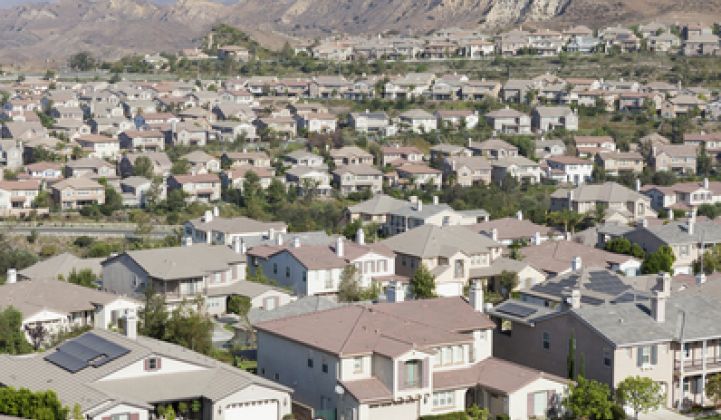Nearly every article about residential property-assessed clean energy (PACE) starts off with the obligatory description of why the program stalled in recent years.
Now seems like a pretty good time to change that.
For three years, PACE hobbled along due to a conflict with federal housing regulators over its structure. But PACE programs for homeowners have seen unprecedented growth in recent months as more local communities put money behind the concept, realizing they're likely not going to get penalized by the federal government.
Yesterday, that resurgence hit an important milestone. The program that started it all in 2008 -- Berkeley, California's Financing Initiative for Renewable and Solar Technology (FIRST) -- is finally expanding throughout California to millions more residents.
CaliforniaFIRST will now be available in seventeen counties and more than 140 cities throughout the state for homeowners who want to finance efficiency, water conservation and solar projects through their property taxes. With $300 million raised to support retrofits, it's the biggest PACE program in the country.
The expansion is gratifying for Cisco DeVries, the man who started Berkeley's initial PACE program to support solar installations in the city. After a burst of activity around the country inspired by Berkeley, federal housing lenders expressed their opposition to PACE in 2010, stopping the momentum. That caused DeVries' financing company, Renewable Funding, to focus on unsecured loans for homeowners and move into the commercial market.
But now that California has stepped up and developed safeguards designed to alleviate concerns from the Federal Housing Finance Agency, PACE is back up and running at a bigger scale than ever.
"We've been building this for about six years," said DeVries. "The world did not come to an end and we're finally doing exactly what we hoped."
The world almost came to an end for PACE promoters in 2010 when FHFA directed the two largest government-backed mortgage lenders, Fannie Mae and Freddie Mac, to stop underwriting mortgages for homeowners who were participating in the program. Because PACE loans take priority if a homeowner defaults or moves, federal regulators worried they would ultimately hurt Fannie and Freddie.
But the wave of defaults never came, and FHFA has not stepped in to stop the program. And as long as companies selling PACE-backed retrofits explain to homeowners that they are on the hook for paying off the loan if they move or refinance, many customers are still willing to participate.
The resurgence has largely centered in California. Earlier this year, the state set up a $10 million loan-loss reserve fund to backstop any defaults. As part of the fund, state officials also established minimum requirements for participating homeowners and started collecting deeper data on the performance of PACE loans. Although FHFA said the small fund wasn't enough to address its concerns, PACE administrators are hopeful that better data collection will allow them to prove that the program is not risky to lenders.
"It allows for a much calmer approach to this," said DeVries. "In a year or two years, we're going to have a much bigger body of evidence to show them."
That strategy is also being undertaken by the country's biggest residential PACE administrator, Renovate America.
"The idea is to execute projects and gather data in the hopes that we could show that PACE has a positive or neutral impact on lenders," said Renovate America CEO J.P. McNeill in an earlier interview.
There are now 31 states that have passed legislation supporting PACE financing. Only a handful of them have actually funded the program. And among the seven leading states, most are focusing primarily on commercial retrofits where there is no conflict with FHFA.
But if California's approach succeeds, DeVries expects residential PACE to expand quickly.
"A lot of people are going to watch California very carefully to figure out how to do PACE safely and in a way that protects the interest of mortgage lenders," he said.
Investors are also watching carefully. Evidently, they like what they see.
Renewable Funding recently secured a $300 million credit facility to expand the CaliforniaFIRST program to hundreds of cities. And Renovate America also raised $50 million in equity to expand its own offerings.
"There's broad support for these financing options. From my experience, everyone would like to find a solution that works," said DeVries.
That solution hasn't yet been found. But the problem isn't as big as expected either. So even as FHFA opposition to residential PACE continues, more communities, investors and homeowners are helping it expand.



